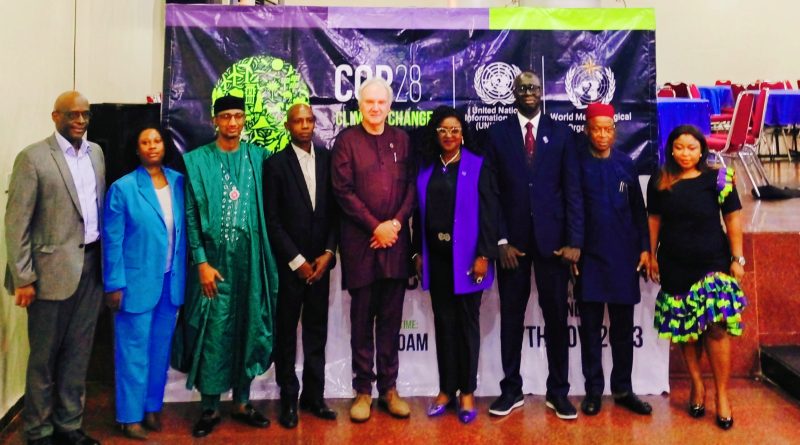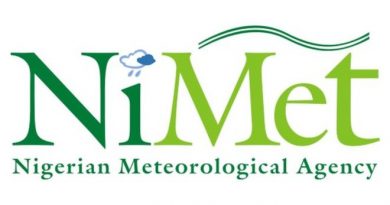UN, WMO, NiMet, others sensitise Journalists on Climate change
… As NiMet DG calls for localisation of climate mitigations
Oru Leonard
Weather and Climate change issue will be top on the agenda of COP 28, which will be held from 30 November to 12 December 2023 in Dubai, UAE, which presents an opportunity for global attention on issues of climate change and its impacts around the world.
The media needs to focus reporting beyond the events at the COP 28 to other issues happening in country to enable people make sense of what they experience daily, and thus demand more action from their leaders.
In view of this, the UN Information Centre for Nigeria and the World Meteorological Organization (WMO), organised a pre COP28 media sensitization on climate change at Abuja on Monday.
In his remarks, the United Nations resident coordinator in Nigeria, Matthias Schmale disclosed that 2023 is set to be the hottest year on record. He said that it is a great injustice that those who suffer the most from climate change have contributed the least to The world’s poorest and most vulnerable communities and are tearing the brunt of a crisis driven by the world’s richest nations
“As journalists, you will have noticed the continuous stream of headlines about record-breaking temperatures this year. The hottest ever July, August, September, and October were all in 2023.
“In July, for four days in a row, the planet reached its hottest day ever recorded. According to preliminary estimates, another record was set just ten days ago on November 17th when the global average surface temperature was more than 2°C above pre-industrial levels for the first time. 2023 is on track to be the hottest year on record!”

He said increasing climate variability is causing more intense and untimely rainfall in some regions, while rising temperatures are causing droughts and crop failures in other regions.
” In the North, desertification is causing the loss of arable land in 15 states. In the Middle Belt, gully erosion and flooding are forcing people from their ancestral homes. In the South, seasonal and flash flooding are destroying lives and livelihoods.
“Last year alone in Nigeria, flooding killed at least 662 people, injured 3,174, displaced about 2.5 million, and destroyed 200,000 homes”, Matthias explained.
“As it stands, the world is headed for a temperature rise of about 3 degrees Celsius above pre-industrial levels by the end of the century, this hellish scenario would be detrimental to nearly all forms of life on Earth.
He tasked the media to provide accurate information about climate change, its causes, and its impact as mis- and disinformation are delaying urgently needed action to ensure a liveable future for the planet.
Speaking, World Meteorological Organization (WMO), Representatives for North, Central, and West Africa, Bernard Edward Gomez noted that; ” the impacts of climate change are no longer distant threats; they are unfolding before our very eyes, affecting every corner of the globe and Nigeria is not an exception. We are witnessing unprecedented heavy rainfall events leading to devastating floods, and rising sea levels threatening coastal communities.
“These impacts are not just environmental; they are profoundly social, economic, and political, exacerbating existing inequalities and threatening the stability of nations”.

He stressed that the role of journalism in addressing climate change cannot be overemphasized.
“As the Fourth Estate of the realm, journalists have a critical responsibility to inform the public about the realities of climate change. By shedding light on the complex issues surrounding climate change, journalists empower individuals, communities, and policymakers to make informed decisions and to act”.
To effectively address climate change, we must foster information sharing, and accountability at all levels, from governance to communities and households.
Also speaking, the Director General Nigerian Meteorological Agency (NiMet), called for localisation of climate mitigation and materials while underscoring the fact that those that suffer climate change contribute less than 5 percent of the causes.
He commended the media for the unflinching to NiMet over the years




